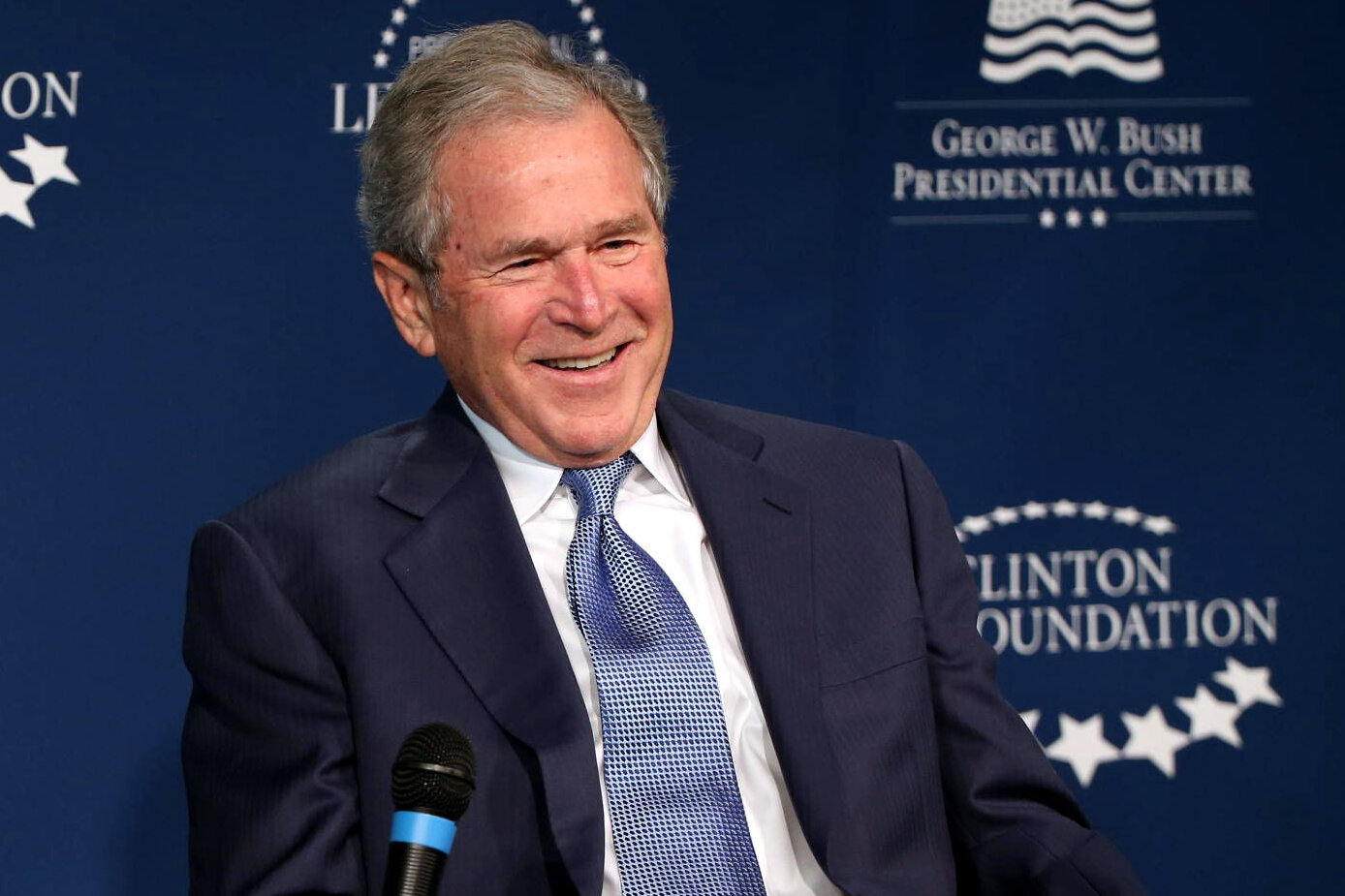Why won’t George W. Bush talk publicly about Donald Trump? It’s simple
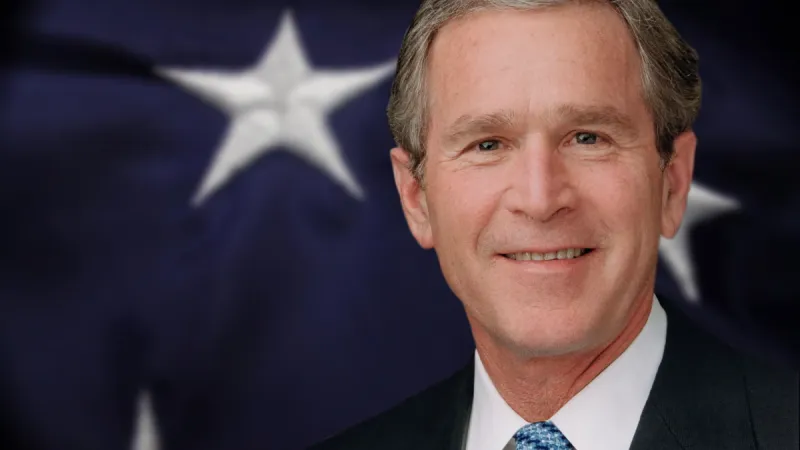
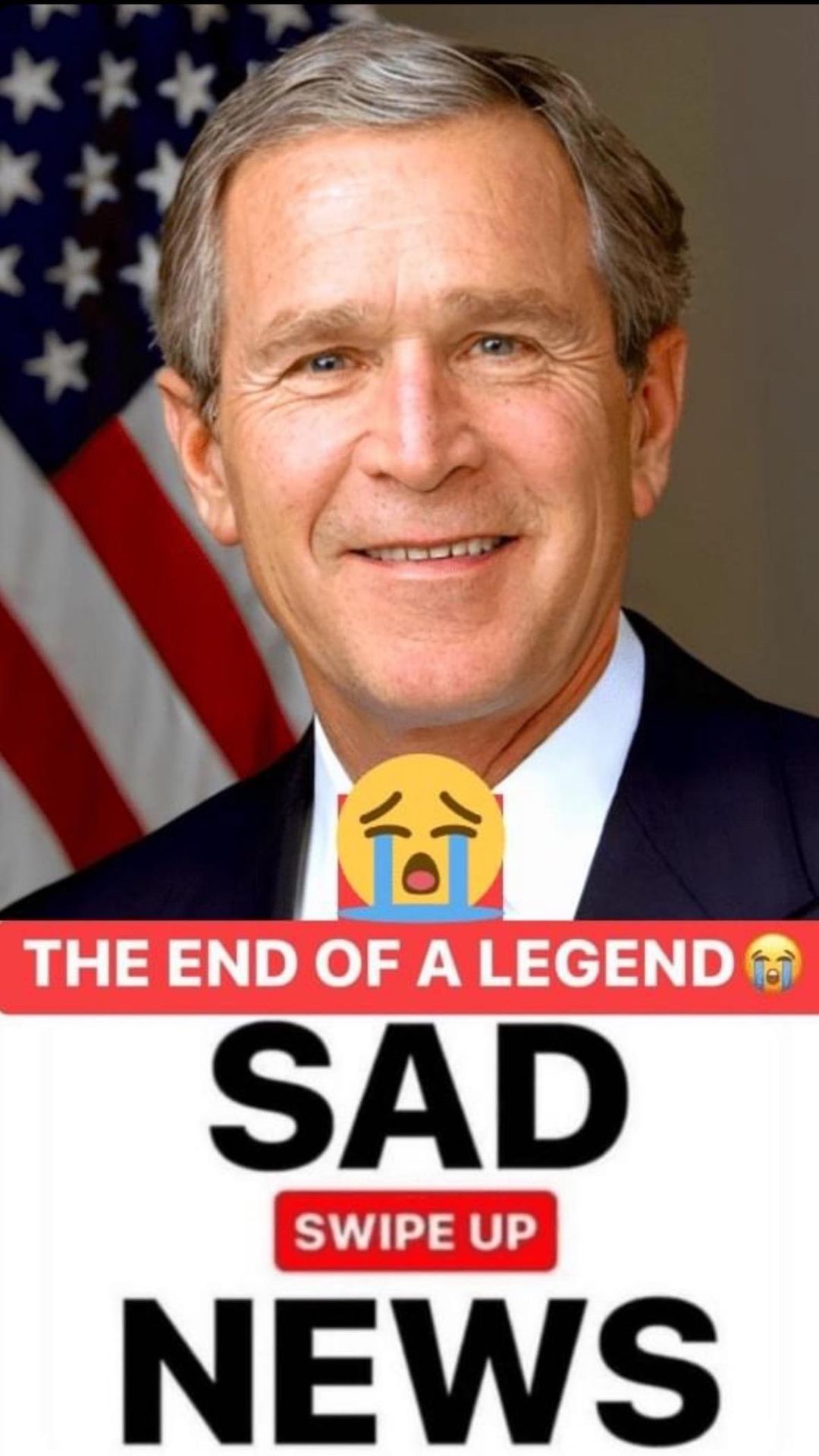
MILWAUKEE – Many Republican convention delegates like to salute the heritage of their party, but few of them these days talk about the next-to-last GOP president, George W. Bush.
And that suits Bush just fine.
For while Bush still keeps up with politics – including the resurgence of Republican successor and fervent critic Donald Trump – he doesn’t like to talk about it publicly.
In paid private speeches, the long-retired 43rd president has been known to joke that both Trump and President Joe Biden are too old for the demands of the office.
“I’m younger than both of the candidates, and I’m too old,” Bush has said in at least one speech, according to a witness who requested anonymity.
Just don’t expect Bush, who turned 78 earlier this month, to say this kind of thing out loud – not even about Trump, the volatile businessman who built his political career in part by trashing the legacy of the Bush dynasty
While people often call on Bush to speak out against Trump and the Republican Party he has remade in his own image, friends and associates said he is standing by his pledge not to critique other presidents and political leaders.
“The job of the president is very hard to begin with,” Ari Fleischer, former White House press secretary for Bush, told USA TODAY. “He doesn’t want to make it harder for anyone, friend or foe.”
“It’s very old school,” Fleischer added. “It’s very gracious. It’s very Bush.”
It also has public benefits for the former president – his approval ratings have more than doubled since he left office more than 15 years ago.
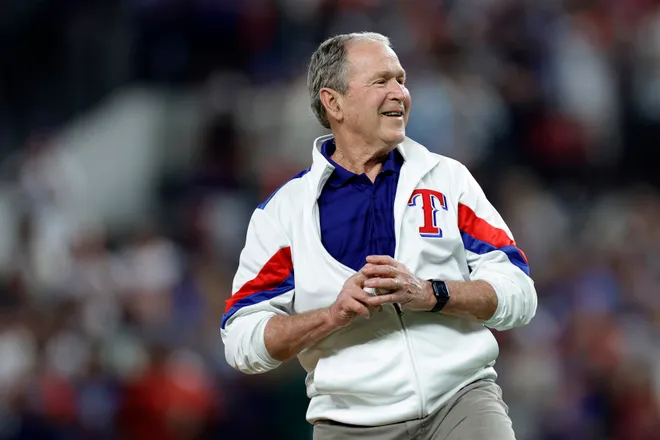
Bush has made the rare exceptions on his public comment policy, most recently a statement with former First Lady Laura Bush after last Saturday’s assassination attempt against Trump.
“Laura and I are grateful that President Trump is safe following the cowardly attack on his life,” Bush said. “And we commend the men and women of the Secret Service for their speedy response.”
‘He’s turned the page’
Since leaving office on Jan. 20, 2009, Bush has made his mark as a book author, the head of an institute based in Dallas, and even as a portrait painter – but not a political pundit.
“He’s turned the page,” said Margaret Spellings, a long-time friend who served as Education Secretary during the Bush administration. “He’s interested and he’s connected and he’s informed – but he’s moved on.”
And vice-versa.
When Republican conventioneers gather in Milwaukee next week to nominate Trump for a third time, the name of George W. Bush may never be heard.
Privately, Bush still follows current events. He gives speeches. He paints. Over the past decade-and-a-half, Bush has hosted dozens of fundraisers for favored Republican candidates, all behind closed doors.
Publicly: not much. Instead, Bush has pursued a unique path for an ex-president, all but walking away from political life. This from the grandson of a U.S. senator and the son of a president, the scion of an historic political family.
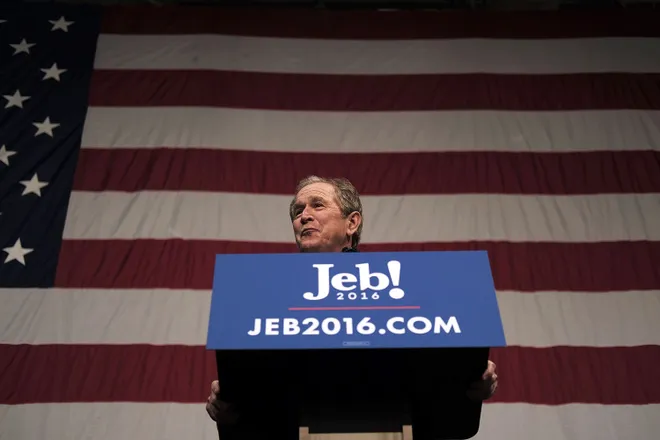
A few dust-ups with Trump
Bush has occasionally tangled with Trump, but it hasn’t amounted to much.
In February of 2016, the former president stumped for younger brother Jeb Bush in his faltering Republican primary campaign against the first-time candidate Trump. Bush praised his sibling’s qualifications, drawing implicit contrasts with Trump by talking about “faith that reveals itself through good works, not loud words.”
That became a part-time pattern after Trump became president. Bush would not call out Trump by name, but made clear he didn’t like his divisive style, and sometimes getting blowback from Trump in process.
After Trump’s inaugural address in 2017 – the speech in which the new president talked about American “carnage” – Bush nor his aides disputed his reported reaction: “That was some weird s—.”
During a 2021 ceremony in Pennsylvania to mark the 20th anniversary of the 9/11 terror attacks, Bush made a point of saying that “so much of our politics has become a naked appeal to anger, fear and resentment.”
Trump, who has often attacked Bush over the invasion of Iraq, said his GOP predecessor “shouldn’t be lecturing us about anything.” He added that “the World Trade Center came down during his watch.”
Bush did leave office with very low approval ratings, sometimes well below 40%, in the wake of criticism of the Iraq war and the financial crisis of 2008. They’ve since jumped above 60%.
After the attempted insurrection by Trump loyalists on Jan. 6, 2021, Bush issued a statement saying that he and Laura Bush found it “a sickening and heartbreaking sight.”
While, again, not citing Trump by name, Bush added: “This is how election results are disputed in a banana republic – not our democratic republic.”
In describing Bush’s approach, Fleischer said: “He doesn’t attack, but he knows how to roll his eyes at things he doesn’t like.”
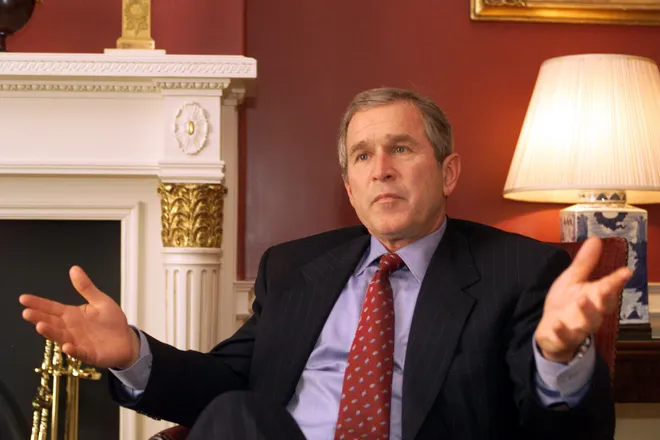
Could you do the country a big favor’
Bush has remained quiet during Trump’s re-emergence and march toward the 2024 Republican presidential nomination. He did not comment on the four sets of indictments against Trump, nor the hush money trial that made him the first convicted felon to seek the presidency from a major party.
Bush has also resisted a steady string of entreaties for him to “say something.”
On July 6, Bush’s birthday, anti-Trump lawyer George Conway used the social media site X to send a unique salutation: “Happy Birthday, Mr. President. Could you do the country a big favor and urge it not to elect a certain convicted felon and psychopath whom I assume you detest as much as the rest of us? Thanks in advance!”
Friends and associates said there’s no real reason for Bush to engage.
For one thing, Bush is a Republican, and believes that a food fight with Trump would only help the Democrats, they said. Bush probably wouldn’t gain much by it either.
Bush also feels, whatever the provocation, he owes Trump the same respect as all his other presidential colleagues.
“He just doesn’t want to be in the game any more,” said presidential historian Mark Updegrove, who pointed out that Bush uses the same phrase as Trump to describe the political environment: Swamp.
Said Updegrove: “When I spoke to Bush shortly after he left the presidency, he said, ‘the scene is a swamp out there right now, and I don’t want to get in the swamp.’ … Since then it’s only gotten swampier.”
Updegrove, author of “The Last Republicans: Inside the Extraordinary Relationship Between George H.W. Bush and George W. Bush,” said Trump-type Republicans wouldn’t respond to Bush criticism anyway.
“His influence in the party has waned,” he said. “It’s an entirely different party.”
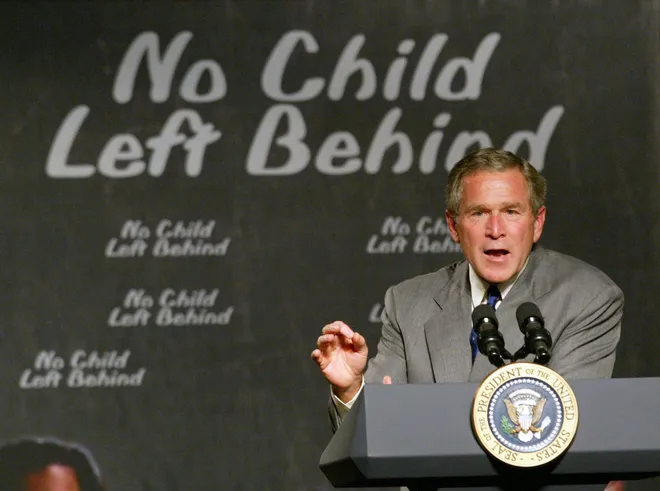
Bush still has a public policy life
Friends and associates said Bush has only withdrawn, mostly, from political life – not public life.
The former president does speak out frequently on policy issues, mostly through his work with the George W. Bush Presidential Center at Southern Methodist University in Dallas. It houses the Bush Institute, a nonpartisan policy organization, as well as his presidential museum.
The former president and his wife appear at events devoted to subjects that animated his presidency, including education, immigration, and help for veterans and military families. Another frequent topic is “strengthening democracy, and advancing free societies.”
“What he’s wanted to do is to have the institute and the center focus on the issues that were important to him and Mrs. Bush when they were in Washington,” said David J. Kramer, executive director of the George W. Bush Institute.
That also means the institute likes to avoid politics as much as possible, especially in these volatile times.
“A lot of things get very polarized very quickly,” Kramer said.
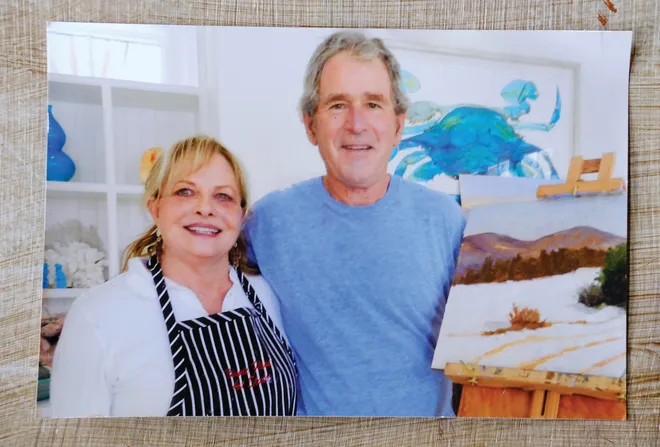
Author, painter
Since leaving office, Bush has performed a more tradition role for former presidents: Book author.
A memoir of his White House years, “Decision Points,” came out in 2010. He also wrote a short biography of President George H.W. Bush entitled “41: A Portrait of My Father,” published in 2014.
The younger Bush has also pursued a non-traditional pastime: Painting. Two books of portrait paintings have touched on Bush-era issues, veterans and migrants.
“Portraits in Courage: A Commander-in-Chief’s Tribute to America’s Warriors,” came out in 2017. Then came “Out of Many, One: Portraits of America’s Immigrants,” published in 2021.
None of these books include the word “Trump.”
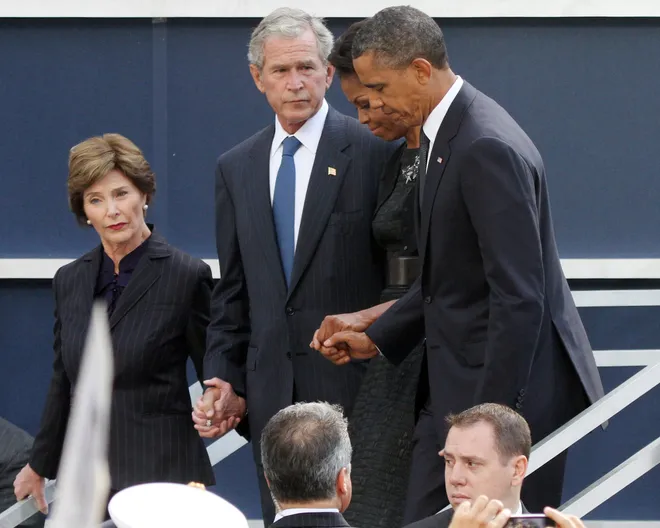
A little politics – in private
Bush also periodically comments on the news. After a private event in October, his office agreed to publicize his remarks about the Oct. 7 Hamas attack on Israel.
“Don’t be surprised if Israel takes whatever actions necessary to defend herself,” Bush said at the event moderated by Updegrove. “It’s going to be ugly for a while.”
Over the years, Bush has hosted dozens of fundraisers for favored Republican candidates. This year’s list has included Republican Senate candidates Dave McCormick of Pennsylvania and Larry Hogan of Maryland. He also has an upcoming event for Maine Sen. Susan Collins, who faces her next reelection in 2026 and opted to skip this week’s RNC in Milwaukee to attend, among others, an event honoring the retiring director of her state’s Potato Board.
An event in 2021 drew attention from Trump, as Bush headlined a fundraiser for Rep. Liz Cheney of Wyoming, a GOP member of the congressional committee that investigated Trump’s role in the Jan. 6 insurrection. She is also the daughter of Bush’s vice president, Dick Cheney, who has criticized Trump several times over the years.
“Bush is the one who got us into the quicksand of the Middle East,” Trump said in a statement that criticized the fundraiser.
Bush did not respond.

Higher approval
Bush’s reticence to inject himself into politics has paid off in terms of public opinion.
His approval ratings are consistently more than 60%, well above what they were in his later years as president, noted Jared Cohen, author of “Life After Power: Seven Presidents and Their Search For Purpose Beyond the White House.”
In the book – which is sold at the Bush museum bookstore – Cohen noted that Bush has prospered with public opinion even though his Republican successor, Trump, rejected many of his policies (and Democrats never approved him in the first place).
“He moved on from politics, and in an age when everything is political, that’s earned him respect.” Cohen said.
For his part, Bush still likes to joke that historians are still debating aspects of “the first George W” – George Washington.
“Whatever the verdict on my presidency, I’m comfortable with the fact that I won’t be around to hear it,” Bush wrote in the epilogue of his memoir. “That’s a decision point only history will reach.”

George W. Bush
president of United States
George W. Bush (born July 6, 1946, New Haven, Connecticut, U.S.) 43rd president of the United States (2001–09), who led his country’s response to the September 11 terrorist attacks in 2001 and initiated the Iraq War in 2003. Narrowly winning the electoral college vote in 2000 over Vice Pres. Al Gore in one of the closest and most-controversial elections in American history, George W. Bush became the first person since Benjamin Harrison in 1888 to be elected president despite having lost the nationwide popular vote. Before his election as president, Bush was a businessman and served as governor of Texas (1995–2000).
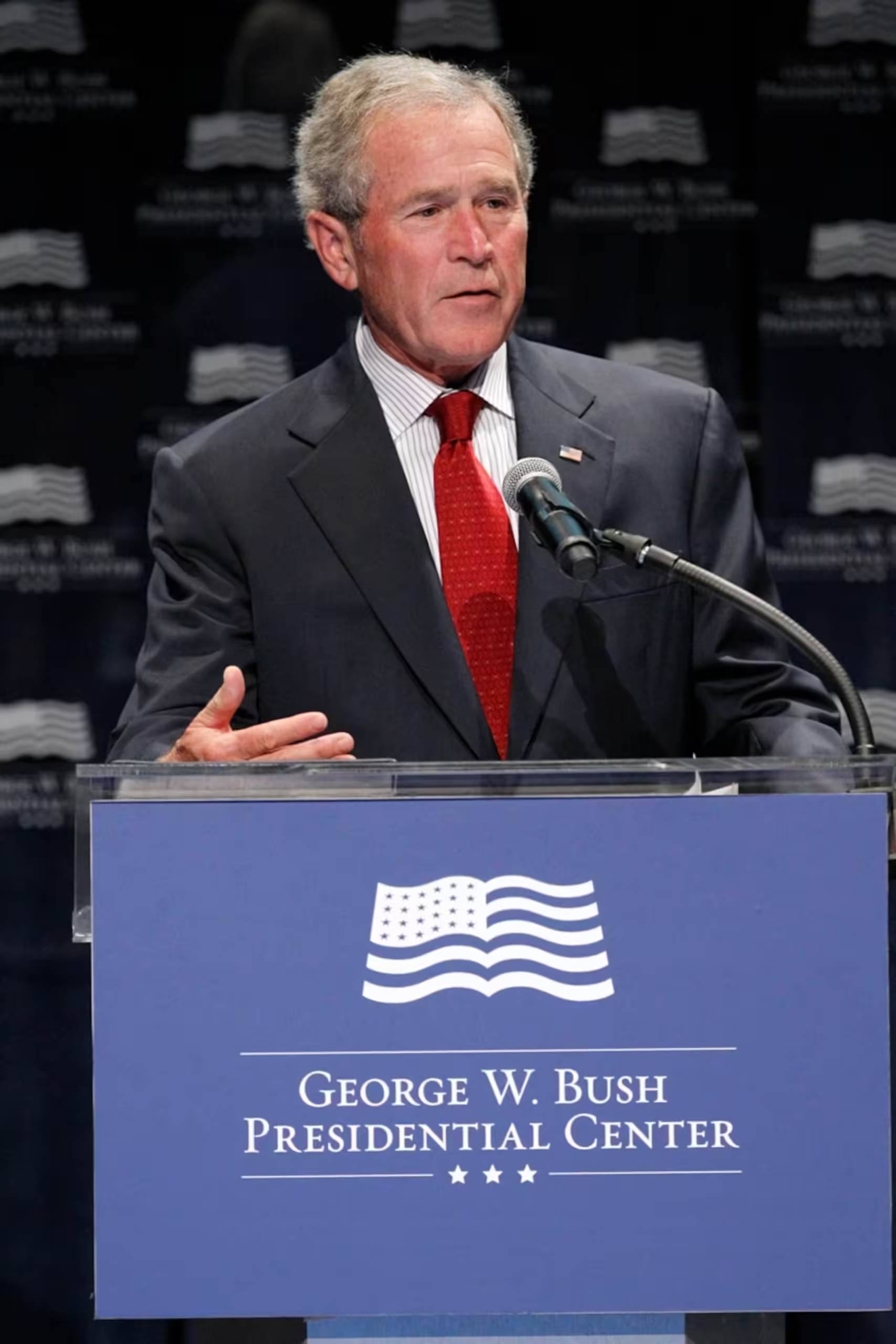
Early life
Bush was the eldest of six children of George H.W. Bush, who served as the 41st president of the United States (1989–93), and Barbara Bush. His paternal grandfather, Prescott Bush, was a U.S. senator from Connecticut (1952–63). The younger Bush grew up largely in Midland and Houston, Texas. From 1961 to 1964 he attended Phillips Academy in Andover, Massachusetts, the boarding school from which his father had graduated. He received a bachelor’s degree in history from Yale University, his father’s and grandfather’s alma mater, in 1968. Bush was president of his fraternity and, like his father, a member of Yale’s secretive Skull and Bones society; unlike his father, he was only an average student and did not excel in athletics.
In May 1968, two weeks before his graduation from Yale and the expiration of his student draft deferment, Bush applied as a pilot trainee in the Texas Air National Guard, whose members were less likely than regular soldiers to fight in the Vietnam War. Commissioned a second lieutenant in July 1968, he became a certified fighter pilot in June 1970. In the fall of 1970, he applied for admission to the University of Texas law school but was rejected. Although Bush apparently missed at least eight months of duty between May 1972 and May 1973, he was granted an early discharge so that he could start Harvard Business School in the fall of 1973. His spotty military record resurfaced as a campaign issue in both the 2000 and 2004 presidential elections.
After receiving an M.B.A. from Harvard in 1975, Bush returned to Midland, where he began working for a Bush family friend, an oil and gas attorney, and later started his own oil and gas firm. He married Laura Welch, a teacher and librarian, in Midland in 1977. After an unsuccessful run for Congress in 1978, Bush devoted himself to building his business. With help from his uncle, who was then raising funds for Bush’s father’s campaign for the Republican presidential nomination, Bush was able to attract numerous prominent investors. The company struggled through the early 1980s until the eventual collapse of oil prices in 1986, when it was purchased by the Harken Energy Corporation. Bush received Harken stock, a job as a consultant to the company, and a seat on the company’s board of directors.
In the same year, shortly after his 40th birthday, Bush gave up drinking alcohol. “I realized,” he later explained, “that alcohol was beginning to crowd out my energies and could crowd, eventually, my affections for other people.” His decision was partly the result of a self-described spiritual awakening and a strengthening of his Christian faith that had begun the previous year, after a conversation with the Rev. Billy Graham, a Bush family friend.
After the sale of his company, Bush spent 18 months in Washington, D.C., working as an adviser and speechwriter in his father’s presidential campaign. Following the election in 1988, he moved to Dallas, where he and a former business partner organized a group of investors to purchase the Texas Rangers professional baseball team. Although Bush’s investment, which he made with a loan he obtained by using his Harken stock as collateral, was relatively small, his role as managing partner of the team brought him much exposure in the media and earned him a reputation as a successful businessman. When Bush’s partnership sold the team in 1998, Bush received nearly $15 million.
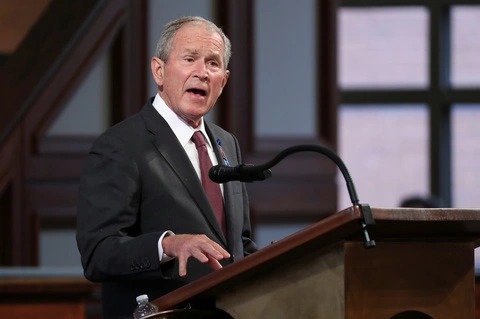
Governor of Texas
In 1994 Bush challenged Democratic incumbent Ann Richards for the governorship of Texas. A major issue in the campaign concerned Bush’s sale of all his Harken stock in June 1990, just days before the company completed a second quarter with heavy losses. An investigation by the Securities and Exchange Commission (SEC) in 1991 into the possibility of illegal insider trading (trading that takes advantage of information not available to the public) did not uncover any wrongdoing. Bush won the election with 53 percent of the vote (compared with 46 percent for Richards), thus becoming the first child of a U.S. president to be elected a state governor.
As governor, Bush increased state spending on elementary and secondary education and made the salaries and promotions of teachers and administrators contingent on their students’ performance on standardized tests. His administration increased the number of crimes for which juveniles could be sentenced to adult prisons following custody in juvenile detention and lowered to 14 the age at which children could be tried as adults. Throughout his tenure Bush received international attention for the brisk use of capital punishment in Texas relative to other states. Bush signed into law several measures aimed at tort reform, including one that imposed new limits on punitive damages and another that narrowed the legal definition of “gross negligence.” Reelected in 1998 with nearly 70 percent of the vote, Bush became the first Texas governor to win consecutive four-year terms (in 1972 voters had approved a referendum that extended the governor’s term from two years to four).
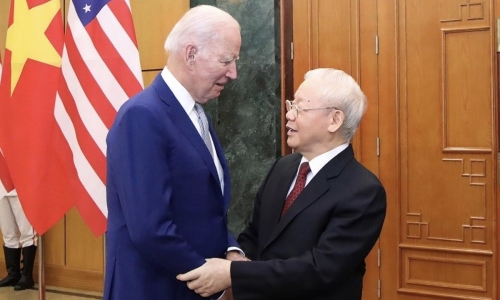
Bush formally announced his candidacy for the Republican presidential nomination in June 1999. He described his political philosophy as “compassionate conservatism,” a view that combined traditional Republican economic policies with concern for the underprivileged. Despite Bush’s refusal to give direct answers to questions about his drinking and possible use of illegal drugs (he implied that he had not used illegal drugs since 1974), he won the Republican nomination, taking a strong lead in public opinion polls over Vice Pres. Al Gore, the Democratic Party nominee; Ralph Nader, the Green Party candidate; and political journalist Patrick Buchanan, the nominee of the Reform Party. His running mate was Dick Cheney, former chief of staff for Pres. Gerald Ford and secretary of defense during the presidency of Bush’s father.
As the general election campaign continued, the gap in the polls between Bush and Gore narrowed to the closest in any election in the previous 40 years. On election day the presidency hinged on the 25 electoral votes of Florida, where Bush led Gore by fewer than 1,000 popular votes after a mandatory statewide machine recount. After the Gore campaign asked for manual recounts in four heavily Democratic counties, the Bush campaign filed suit in federal court to stop them. For five weeks the election remained unresolved as Florida state courts and federal courts heard numerous legal challenges by both campaigns. Eventually the Florida Supreme Court decided (4–3) to order a statewide manual recount of the approximately 45,000 “undervotes”—ballots that machines recorded as not clearly expressing a presidential vote. The Bush campaign quickly filed an appeal with the U.S. Supreme Court, asking it to delay the recounts until it could hear the case; a stay was issued by the court on December 9. Three days later, concluding (7–2) that a fair statewide recount could not be performed in time to meet the December 18 deadline for certifying the state’s electors, the court issued a controversial 5–4 decision to reverse the Florida Supreme Court’s recount order, effectively awarding the presidency to Bush. By winning Florida, Bush narrowly won the electoral vote over Gore by 271 to 266—only 1 more than the required 270 (one Gore elector abstained).
With his inauguration, Bush became only the second son of a president to assume the nation’s highest office; the other was John Quincy Adams (1825–29), the son of John Adams (1797–1801).
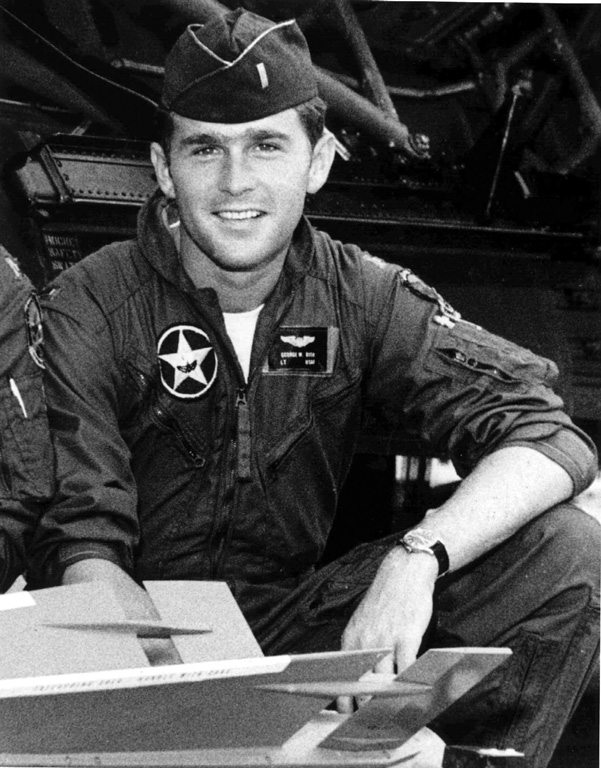
Presidency of George W. Bush
Early initiatives
Bush was the first Republican president to enjoy a majority in both houses of Congress since Dwight D. Eisenhower in the 1950s. Taking advantage of his party’s strength, Bush proposed a $1.6 trillion tax-cut bill in February 2001. A compromise measure worth $1.35 billion was passed by Congress in June, despite Democratic objections that it unfairly benefited the wealthy. In the same month, however, control of the Senate formally passed to the Democrats after Republican Sen. James Jeffords left his party to become an independent. Subsequently, many of Bush’s domestic initiatives encountered significant resistance in the Senate.
In a report issued in May 2001, the National Energy Policy Development Group, a task force headed by Vice Pres. Dick Cheney, called for increasing the production of fossil fuels and nuclear power in the country by opening more federal lands to mining and oil and gas exploration, extending tax credits and other subsidies to energy companies, and easing environmental regulations. In July a coalition of nonprofit organizations filed suit to make public the secret deliberations of the task force and the identities of the groups it met with. (The case was decided in the administration’s favour by the Supreme Court in June 2004.)
In foreign affairs, the Bush administration announced that the United States would not abide by the Kyoto Protocol on reducing the emission of gases responsible for global warming, which the United States had signed in the last days of the Bill Clinton administration, because the agreement did not impose emission limits on developing countries and because it could harm the U.S. economy. The administration also withdrew from the 1972 Anti-Ballistic Missile Treaty and attempted to secure commitments from various governments not to extradite U.S. citizens to the new International Criminal Court, whose jurisdiction it rejected.
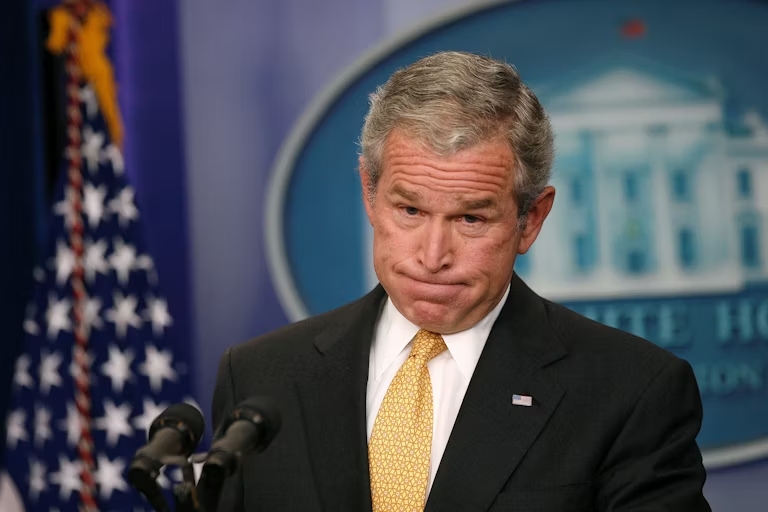
The September 11 attacks
On September 11, 2001, Bush faced a crisis that would transform his presidency. That morning, four American commercial airplanes were hijacked by Islamist terrorists. Two of the planes were deliberately crashed into the twin towers of the World Trade Center in New York City, destroying both towers and collapsing or damaging many surrounding buildings, and a third was used to destroy part of the Pentagon building outside Washington, D.C.; the fourth plane crashed outside Pittsburgh, Pennsylvania, after passengers apparently attempted to retake it (see September 11 attacks). The crashes—the worst terrorist incident on U.S. soil—killed some 3,000 people.
The Bush administration accused radical Islamist Osama bin Laden and his terrorist network, al-Qaeda (Arabic: “the Base”), of responsibility for the attacks and charged the Taliban government of Afghanistan with harbouring bin Laden and his followers (in a videotape in 2004, bin Laden acknowledged that he was responsible). After assembling an international military coalition, Bush ordered a massive bombing campaign against Afghanistan, which began on October 7, 2001. U.S.-led forces quickly toppled the Taliban government and routed al-Qaeda fighters, though bin Laden himself remained elusive (he was eventually killed in a raid by U.S. forces in Pakistan in 2011). In the wake of the September 11 attacks and during the war in Afghanistan, Bush’s public-approval ratings were the highest of his presidency, reaching 90 percent in some polls.
